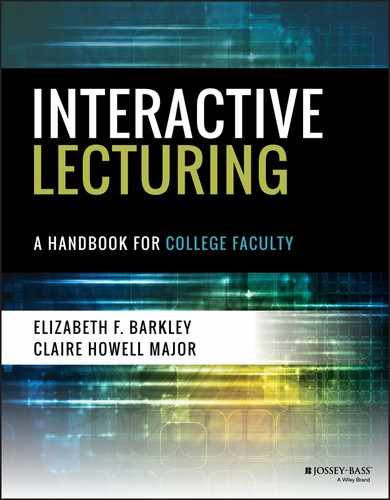CHAPTER 10
Generating Enthusiasm and Interest
Those of us who have been teaching for some time know that motivation is critical to students' ability to learn. Students who are highly motivated to learn from our lectures are willing to focus their attention and invest the effort required to understand and remember the information we present. Research on lecturing and learning supports the importance of motivation for learning, particularly highlighting declines in learning due to low motivation (see, for example, Bolkan, Goodboy, & Kelsey, 2016; Komarraju & Karau, 2008). We want students to be motivated to learn from our lectures, but getting them to engage with a presentation can be difficult, especially if they don't have much interest in the topic. How can we help students be motivated to put in the effort to learn from our lectures?
Although there are many definitions of and theories about motivation, researchers who specialize in motivation in the classroom (e.g., Wentzel & Brophy, 2014) rely on the expectancy × value model as an explanation. This model suggests that the amount of effort that people are willing to expend on a task is in proportion to the degree to which they expect to be able to successfully perform the task (expectancy) and the degree to which they value the rewards as well as the processes of the task itself (value). The techniques in Part 3 of this book are especially useful for promoting the high-expectancy component of motivation because they are designed to help students be successful in their efforts to learn from your lecture presentation. The Tips in Part 2 of this book are generally helpful in addressing both components of the motivation model, but the Tips in this chapter are especially useful for setting up conditions that encourage students to find value in your lecture presentation. We summarize the Tips in Exhibit 10.1.
References
- Bolkan, S., Goodboy, A. K., & Kelsey, D. M. (2016). Instructor clarity and student motivation: Academic performance as a product of students' ability and motivation to process instructional material. Communication Education, 65(2), 129–148.
- Komarraju, M., & Karau, S. J. (2008). Relationships between the perceived value of instructional techniques and academic motivation. Journal of Instructional Psychology, 35(1), 70–82.
- Wentzel, K. R., & Brophy, J. (2014). Motivating students to learn (4th ed.). New York, NY: Routledge.
